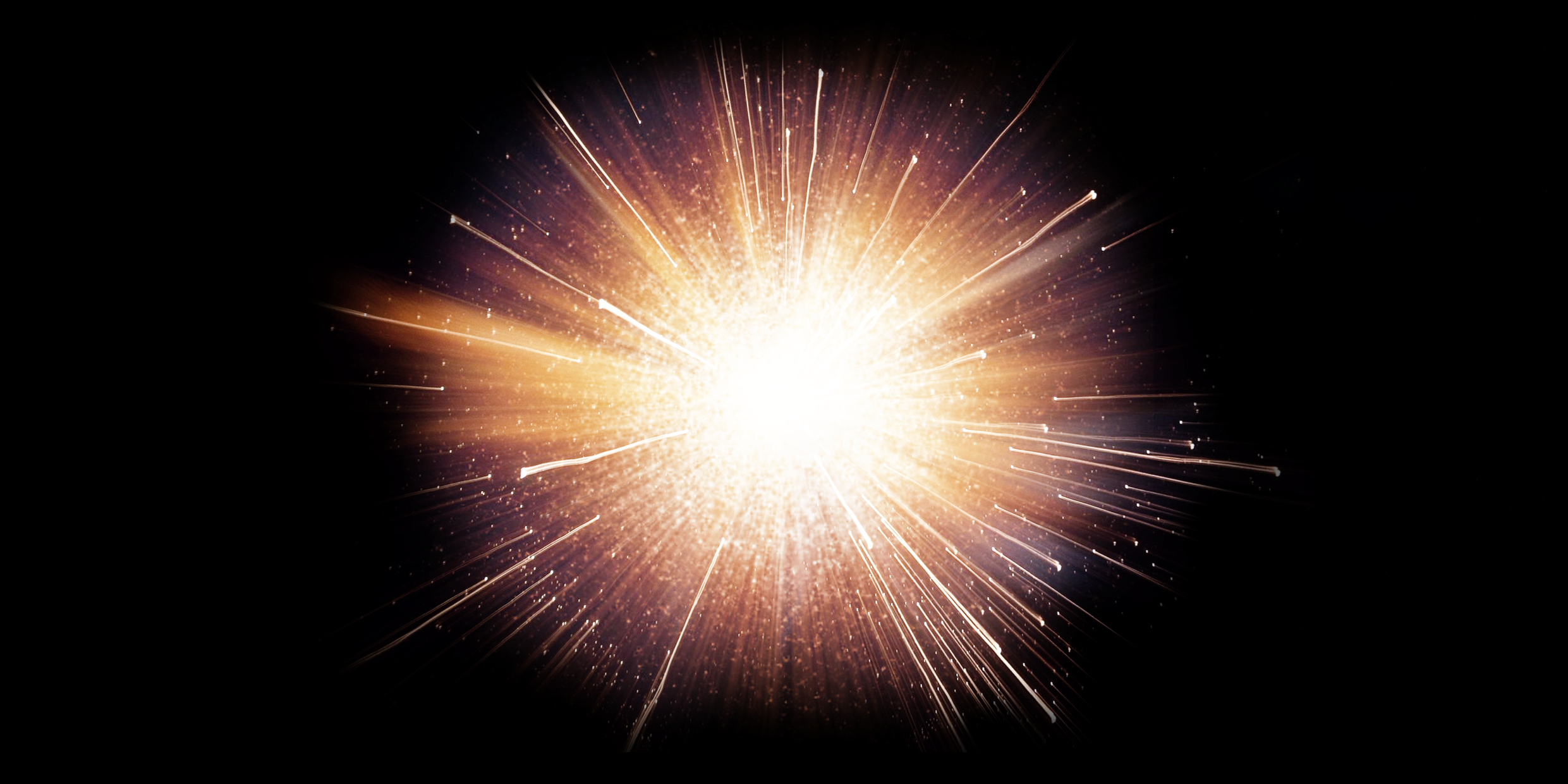Originally published 6 December 1993
The universe began with the Big Sneeze.
A creation myth from Egypt of the third millennium B.C. has God bring the world into being with a sneeze. It’s not a bad image for the Creation as currently described by astronomers. Fifteen billion years ago the universe began with an outward explosion of pure energy. A blaze of gamma rays, x‑rays, and light. Then particles, atoms, stars, and galaxies. A spray of material creation.
Ahh, ahhh, ahhhh-CHOO!
The Big Sneeze. Better than the Big Bang. More poetic, more firmly grounded in the ancient human quest for origins. And more evocative of an explosion from nothing. “Big Bang” suggests a firecracker exploding in preexisting space and time. But space-time came into existence along with the universe, the way a sneeze sometimes comes out of nowhere.
Or how about the Big Ha?
God’s laugh. A great roaring belly laugh that brings all things into being. An ancient Jewish creation text has God create the world with seven laughs. The first laugh is light. A blazingly luminous hoot of laughter. A side-splitting guffaw of gamma rays, x‑rays, and a rainbow of colors.
The Big Ha puts a little fun back into creation.
I offer these suggestions in response to an invitation tendered by astronomy writer Timothy Ferris in the August [1993] issue of Sky & Telescope magazine. He stressed the inappropriateness of the name we currently give to Creation: the Big Bang. It is ugly, misleading, and trivializing, he said; a name more suitable for a dormitory brawl than for the primeval fireball that spawned the starry skies.
Creation.
First, there is nothing. Then an infinitely dense, infinitely hot kernel of energy that expands explosively. Space-time inflates like a balloon that was infinitely small at the beginning. Where does it happen? Everywhere. When does it happen? As time begins.
The universe expands and cools. Energy becomes matter. One hundredth-thousandth of a second after the beginning, the universe is a seething stew of particles and radiation. Fifteen seconds after the beginning the temperature has cooled to a billion degrees and the creation of matter settles down. After 700,000 years, protons and electrons bind together to make atoms of hydrogen and helium. Later still, come stars and galaxies.
The term “Big Bang” was coined in 1950 by astronomer Fred Hoyle, a champion of the so-called Steady State theory of the universe that has things always more or less the way they are now, with no beginning or end.
Back in 1950, the primeval fireball theory was a bit of an upstart, and Hoyle dismissed it derisively as “the Big Bang.” His scornful label stuck, even as new observations eventually led to an almost universal triumph of the explosive beginning over the Steady State.
Now it’s time for a new name, says Ferris, something more dignified, more accurate, less accidental in its origin. Taking up his challenge, the editors of Sky & Telescope invited readers to re-name the Big Bang, in a contest to be judged by Timothy Ferris, Carl Sagan, and Hugh Downs. At the Aug. 31 [1993] deadline for submissions, the magazine had received 13,000 entries from around the world. The winner will be announced at the January [1994] meeting of the American Astronomical Society in Washington, D.C., and in a future issue of the magazine.
No one guarantees that the winning name will be adopted by astronomers, but who knows? Some lucky person may have the honor of naming the Creation.
As usual, I was late getting around to filing an entry and missed the deadline. I have a feeling the judges wouldn’t have looked favorably upon the Big Sneeze or the Big Ha. Too frivolous, they would say, though these are among the most ancient and honorable metaphors we have for Creation.
Instead, they’ll be looking for something like Alpha‑1, Cosmodawn, Uniseed, GENesis, Apsutime (from Apsu, the Babylonian begetter of gods), Protophos (from the Greek for “first light”), or something else that looks like it was dreamed up by an ad agency.
I’ll stick to my guns. I’ll go for something with a mild gamma-burst of humor. Something that doesn’t take itself too seriously.
How about the Big Speak?
Among ancient myths, the Word is one of the most universal images of creation. In the beginning was the Word, and the Word was made flesh.
Christians have tended to appropriate the Word to themselves, but it can also be found, for example, in creation stories of the Mayas of Central America, the Maoris of New Zealand, and the Tanzanians of Africa. God speaks, and the word becomes the world.
“The Word was not something that could be seen,” says the Tanzanian myth, “it was a force that enabled one thing to create another.” Exceedingly apt. The Big Speak.
But “Speak” sounds terribly pompous. Like a sermon. Like a snooty pronouncement. How about something more whimsical? How about the Big Squawk?
Raven, the trickster god of the Eskimos, creates the world with a bit of mischief. Let Raven speak. A wonderful, explosive, glottal call. The bird-Word.
Ancient. Universal. Tongue-in-cheek.
An infinitely fulsome cr-r-r-cruck of Creation.
The Big Squawk.
Over 13,000 entries were submitted to the contest to rename the moment of creation, and the assembled jury decided that none of them were better than the ‘Big Bang.’ — Ed.



